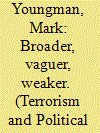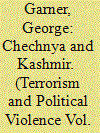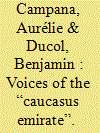| Srl | Item |
| 1 |
ID:
166667


|
|
|
|
|
| Summary/Abstract |
In October 2007, veteran Chechen field commander Dokka Umarov proclaimed the formation of the Caucasus Emirate (IK), formalising the victory of the North Caucasus insurgency’s Islamist wing over its nationalist-separatists. During Umarov’s time as leader, the North Caucasus experienced sustained violence and the IK claimed responsibility for multiple terrorist attacks in and beyond the region. However, despite the importance of ideology in understanding insurgent behaviour, the IK’s ideology and Umarov’s role in shaping it remain understudied. Using Social Movement Theory’s concept of framing to analyse Umarov’s communiqués throughout his lengthy tenure (June 2006–September 2013), this article identifies three distinct phases in Umarov’s ideological positioning of the insurgency: nationalist-jihadist (June 2006–October 2007); Khattabist (October 2007–late 2010); and partially hybridised (late 2010–September 2013). The article contributes to debates over typologies of jihadist actors by highlighting the difficulties in applying them to the North Caucasus and provides a clearer understanding of the IK’s ideological transformation and the limits to its engagement with external actors. The article also illustrates that weakness was a key factor in explaining that transformation and identifies several avenues for research that could further enhance our understanding of the IK’s ideology and the role it plays.
|
|
|
|
|
|
|
|
|
|
|
|
|
|
|
|
| 2 |
ID:
121902


|
|
|
|
|
| Publication |
2013.
|
| Summary/Abstract |
This article examines the transformation of the Chechen conflict from a predominately nationalist to jihadist struggle, and compares the similar changes that took place in the Kashmiri insurgency. Using global jihadist strategy and ideology, and the accompanying influence of Al Qaida, both conflicts are shown to have taken on a new ideology and to have expanded beyond previous areas of operation. In both instances, the political leadership wrapped themselves in the mantle of political Islam (Islamism) as ensuing violence led to rapid socioeconomic transformation and social breakdown, thus allowing foreign jihadists to exert power and take up/divert the cause. In the past few years, two main groups originating in Chechnya and Kashmir have taken on Western targets and become more indoctrinated in Al Qaida's global jihadist ideology: the Caucasus Emirate (CE) and Lashkar-e-Taiba (LeT). The opportunist franchising strategy of Al Qaida could come to play a role in the future of both groups, especially if the CE is able to coalesce into a more unified front. More importantly, the global jihadist attributes of the CE must begin to garner the same attention in the Western world as that of LeT.
|
|
|
|
|
|
|
|
|
|
|
|
|
|
|
|
| 3 |
ID:
140867


|
|
|
|
|
| Summary/Abstract |
This article looks at Internet use by insurgent groups in the North Caucasus in the context of a regional diffusion of violence. Using a mixed methods research design that combines hyperlink network analysis and micro-discourse analysis, it examines the online characteristics of the Caucasus Emirate and the main frames conveyed by the websites affiliated with the Emirate. It demonstrates the existence of a network of cross-referencing websites that, collectively, articulate the Emirate's political agenda online and allow for the dissemination of frames across the Web. It also shows that while jihadism provides a cultural resource that fosters a global sense of community, the jihadization of discourse does not eradicate local references as the local dynamics of the conflict have a strong impact on online communicative strategies. Finally, although based on a specific case study, this article highlights the potential of a mixed methods research design as applied to an analysis of virtual insurgent networks.
|
|
|
|
|
|
|
|
|
|
|
|
|
|
|
|